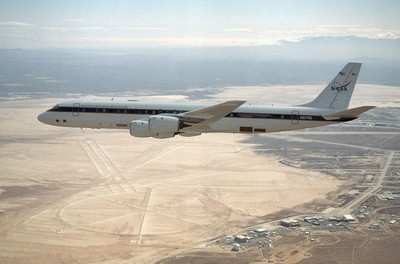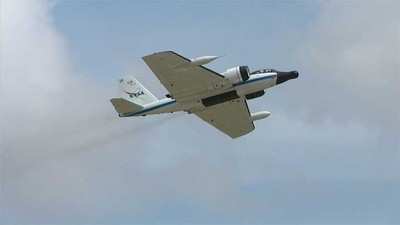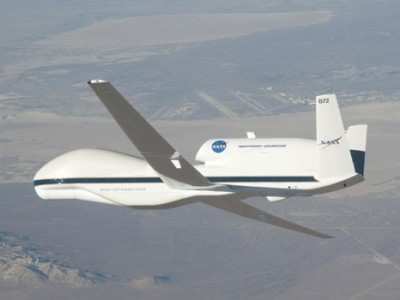Genesis And Rapid Intensification Process Will Look At How
Hurricanes Strengthen
 Three NASA aircraft will begin
flights to study tropical cyclones on August 15 during the agency's
first major U.S.-based hurricane field campaign since 2001. The
Genesis and Rapid Intensification Processes mission, or GRIP, will
study the creation and rapid intensification of hurricanes.
Three NASA aircraft will begin
flights to study tropical cyclones on August 15 during the agency's
first major U.S.-based hurricane field campaign since 2001. The
Genesis and Rapid Intensification Processes mission, or GRIP, will
study the creation and rapid intensification of hurricanes.
One of the major challenges in tropical cyclone forecasting is
knowing when a tropical cyclone is going to form. Scientists will
use the data from this six-week field mission to better understand
how tropical storms form and develop into major hurricanes. Mission
scientists will also be looking at how storms strengthen, weaken
and die.
"This is really going to be a game-changing hurricane
experiment," said Ramesh Kakar, GRIP program scientist at NASA
Headquarters in Washington. "For the first time, scientists will be
able to study these storms and the conditions that produce them for
up to 20 hours straight. GRIP will provide a sustained, continuous
look at hurricane behavior at critical times during their formation
and evolution."

NASA DC8
GRIP is being led by Kakar and three project scientists: Scott
Braun and Gerry Heymsfield of NASA's Goddard Space Flight Center in
Greenbelt, Md., and Edward Zipser of the University of Utah in Salt
Lake City.
Three NASA satellites will play a key role in supplying data
about tropical cyclones during the field mission. The Tropical
Rainfall Measuring Mission, or TRMM, managed by both NASA and the
Japan Aerospace Exploration Agency, will provide rainfall estimates
and help pinpoint the locations of "hot towers" or powerhouse
thunderstorms in tropical cyclones. The CloudSat spacecraft will
provide cloud profiles of storms, which include altitude,
temperatures and rainfall intensity.
Several instruments onboard NASA's Aqua satellite will provide
infrared, visible and microwave data that reveal such factors as
temperature, air pressure, precipitation, cloud ice content,
convection and sea surface temperatures.
The three NASA aircraft taking part in the mission are a DC-8,
WB-57 and a remotely piloted Global Hawk. The DC-8 will fly out of
the Fort Lauderdale-Hollywood International Airport in Florida. The
WB-57 will be based at the NASA Johnson Space Center's Ellington
Field in Houston. The Global Hawk will be piloted and based from
NASA's Dryden Flight Research Center, in Palmdale, CA, while flying
for up to 20 hours in the vicinity of hurricanes in the Atlantic
and Gulf of Mexico.

NASA WB-57
The aircraft will carry a total of 15 instruments, ranging from
an advanced microwave sounder to dropsondes that take measurements
as they fall through the atmosphere to the ocean surface. In order
to determine how a tropical cyclone will behave, the instruments
will analyze many factors including: cloud droplet and aerosol
concentrations, air temperature, wind speed and direction in storms
and on the ocean's surface, air pressure, humidity, lightning,
aerosols and water vapor. The data also will validate the
observations from space.
"It was a lot of hard work to assemble the science team and the
payload for the three aircraft for GRIP," Kakar said. "But now that
the start of the field experiment is almost here, we can hardly
contain our excitement."
Several NASA field centers are involved in the mission including
Goddard, Johnson, Dryden, the Ames Research Center in Moffett
Field, Calif., Jet Propulsion Laboratory in Pasadena, CA, Langley
Research Center in Hampton, Va., and Marshall Space Flight Center
in Huntsville, AL. Centers provide scientists, instrument teams,
project management or aircraft operations.

NASA Global Hawk
GRIP mission planning is being coordinated with two separate
hurricane airborne research campaigns that will be in the field at
the same time. The National Science Foundation is sponsoring the
PRE-Depression Investigation of Cloud-systems in the Tropics
mission. The National Oceanic and Atmospheric Administration is
conducting the Intensity Forecast Experiment 2010. These flights
will be based in St. Croix in the Virgin Islands and Tampa, FL.
 ANN's Daily Aero-Term (04.26.24): DETRESFA (Distress Phrase)
ANN's Daily Aero-Term (04.26.24): DETRESFA (Distress Phrase) ANN's Daily Aero-Linx (04.26.24)
ANN's Daily Aero-Linx (04.26.24) Airborne 04.22.24: Rotor X Worsens, Airport Fees 4 FNB?, USMC Drone Pilot
Airborne 04.22.24: Rotor X Worsens, Airport Fees 4 FNB?, USMC Drone Pilot Airborne 04.24.24: INTEGRAL E, Elixir USA, M700 RVSM
Airborne 04.24.24: INTEGRAL E, Elixir USA, M700 RVSM Airborne-NextGen 04.23.24: UAVOS UVH 170, magni650 Engine, World eVTOL Directory
Airborne-NextGen 04.23.24: UAVOS UVH 170, magni650 Engine, World eVTOL Directory






